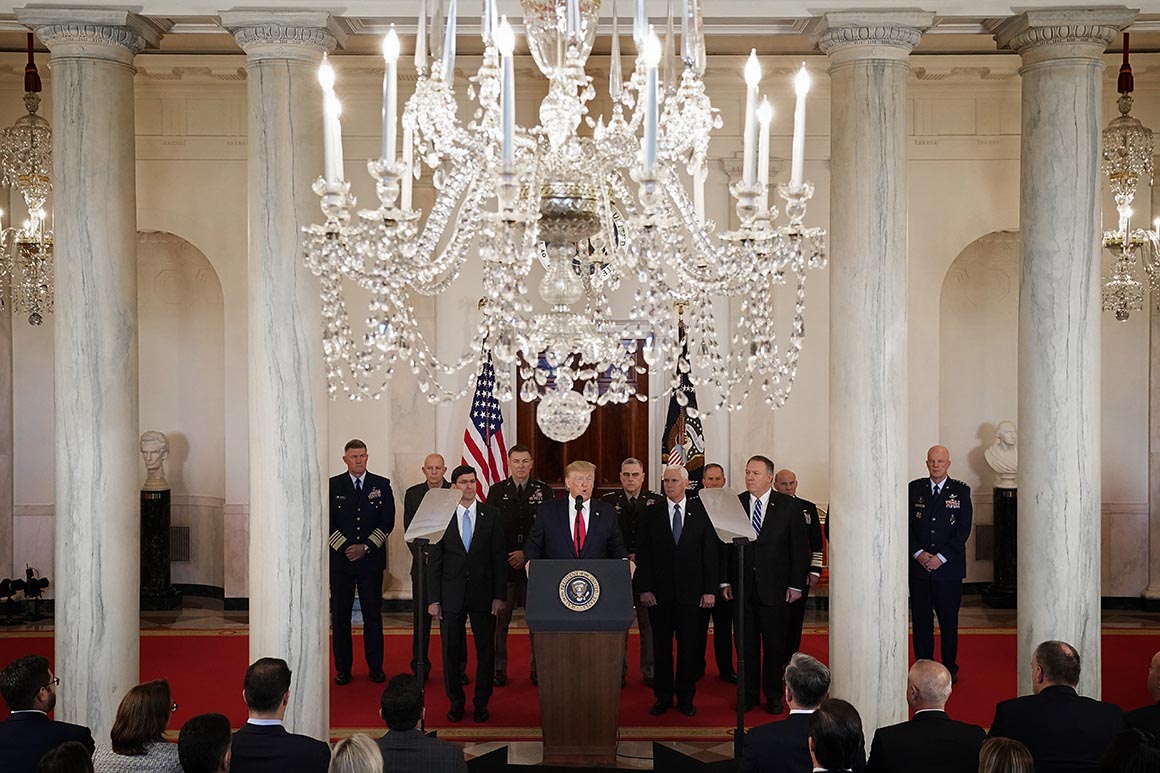
Trump is getting what “he wanted to do all along, which is to get into a negotiating position. Now he’s got their own foreign minister saying they’re ready to do that,” Inhofe said. “He’s in a good position. I know there are a lot of people that think that he‘s got to go in there and go for that blood and all that. Why do that? He’s already won.”
And at least one Senate Democrat was swayed by a classified briefing on Wednesday about the killing of Soleimani. Sen. Joe Manchin (D-W.Va.) said he now had a “better understanding right now of why they did what they did when they did it.”
But to most Democrats, Trump’s strike in Iran was just the latest example of his erraticism. Trump has spent years trashing Obama’s 2015 deal with Iran that was built on international engagement — in many ways, the diplomatic result he is looking for now.
And they say that the U.S. is in a worse position than it is a week ago. As Sen. Martin Heinrich (D-N.M.) put it, “I worry that President Trump’s legacy will be a nuclear-armed Iran.”
“Anything that moves us toward more de-escalation is positive. But I think overall there just has been no strategy, no proportionality, no predictability in the administration’s response from one event to the next. And I think that is why we got to such a bad place,” he said.
Still, there are more battles ahead for Trump to win — and his administration did him no favors in ticking off two Republican senators on Wednesday.
Sens. Mike Lee (R-Utah) and Paul of Kentucky said they will support an effort to constrain Trump’s military stance toward Iran, mostly because of how insufficient they found Wednesday’s briefing.
„One of the messages that we received from the briefers was: Do not debate, do not discuss the issue of appropriateness of further military intervention against Iran. And that if you do you’ll be emboldening Iran,” Lee groused. „It is not acceptable … to come in and tell us that we can’t debate and discuss the appropriateness of military intervention against Iran. It’s un-American. It’s unconstitutional. And it’s wrong. And I hope they will show more deference to their limited power in the future.”
Experts warn that beyond the missile attack seen Tuesday night, Iran could push for proxies to attack the U.S. or allies, could launch costly and disruptive cyberattacks. The Department of Homeland Security warned after Soleimani’s death that “an attack in the homeland may come with little or no warning.”
“The regime will look for other opportunities and we remain on an escalation glide path because they have chosen to more actively confront Washington to bring about an end of the sanctions,” said Behnam Ben Taleblu, a senior fellow at the Foundation for Defense of Democracies.
But Trump aides and allies insist the president’s approach has left the U.S. approach to Iran better than it was under his predecessor. Trump’s decision to kill Soleimani, they argue, sent a clear message to the Iranian regime that is intended to deter future attacks from Iran-linked groups.
Those in defense of the Trump administration’s maximum pressure campaign say that despite the 2015 nuclear deal, the U.S. and Iran were always on a collision course. Except now, as the two countries come head to head, Trump is dealing with an economically anemic regime.
Within the Republican Party, for a day at least, many allies and critics alike were too relieved to quibble on Wednesday.
“He did a very nice job with his address,” said Sen. Mitt Romney (R-Utah). “I’m aware that the action in killing Soleimani, who was a very bad person and deserved to die, that there’s an upside from that act. And a downside.”
“Which of those results occurs long-term depends on what Iran does,” Romney said. “I don’t believe there’s any interest on the part of the president to go to war with Iran.”
Source: politico.com
See more here: news365.stream






